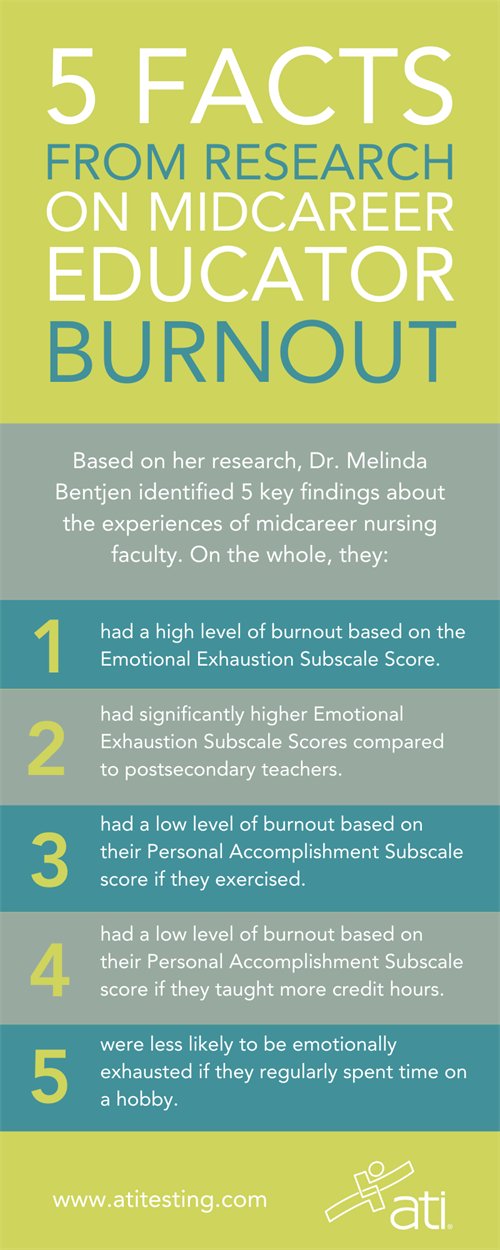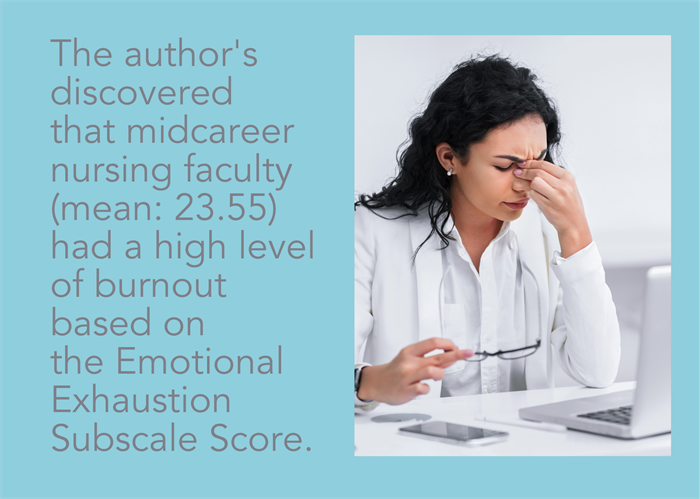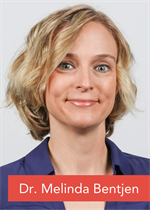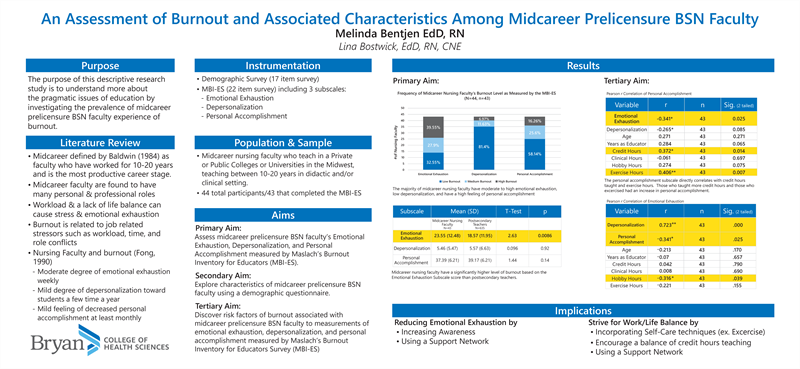WORRIED THAT YOUR NURSE EDUCATORS ARE GETTING BURNED OUT?
THE BEST OPTION TO SOLVE BURNOUT AMONG NURSE EDUCATORS? EXERCISE

INTRODUCTION:
The compassion, commitment to success, and empathy of nurses is undeniably astounding. Nurses model selflessness every day. Why, then, is modeling self-care not second nature for us? Consider how the burnout rate of nurses is on the rise at an alarming rate. Self-care, then, is crucial in preparing us to perform at our best.
The following article by Dr. Melinda Bentjen, an honored professor at Bryan College of Health Sciences (Lincoln, Neb.), details how implementing a self-care plan that incorporates exercise helped 1 nurse take back her passion from the threats of burnout. — Larissa Bair, MSN, RN, CEN, ATI Regional Manager, Post-Grad Products
By Melinda Bentjen, Ed.D., MSN, RN-BC
For Janice, a nurse educator of 13 years, burnout started with one simple word: “Yes.”
Janice had a full list of commitments in both her professional and personal life.
Professionally, she was:
- On 6 college committees
- Serving as Chair of the Curriculum Committee
- Teaching 60+ students in a newly developed clinical judgment course.
And while those duties alone might have caused even seasoned educators to struggle, Janice also had numerous personal responsibilities. In her free time, she was:
- A wife
- A mother of 4 children — ages 12 to 23
- Caregiver to a father with Alzheimer’s Disease.
Nevertheless, when administrators in her nursing program asked her to share her expertise in curriculum development — and take on the lead role of the program’s curriculum revision — she said, “Yes.”
THE OUTCOMES OF MIDCAREER NURSE EDUCATOR BURNOUT
To accommodate the extra responsibilities, Janice changed her routine. When her packed workday left her unable to accomplish all her duties, she began taking work home. Soon, she was working late into the night trying to complete it all.

But, as time passed, the weight of these many responsibilities began to take their toll:
- She began to feel as if she wasn’t accomplishing anything — despite trying to accomplish so much.
- She was exhausted — both at work and at home.
- She stopped doing the little things that made teaching so rewarding, such as reaching out to students who were struggling with her course to help them improve.
Janice clearly was burned out.
WHY MIDCAREER NURSE EDUCATORS FEEL BURNED OUT
Does this sound familiar?
Why do educators like Janice feel the obligation to take on so many extra responsibilities? In many cases, the cause is a nursing faculty shortage. But the impact of not having enough educators is more serious than putting extra burden on faculty trying to handle the load. The problem is now impacting the future of nursing.
Across the country, the shortage of educators has limited student admissions, which directly impact the nursing shortage. In 2019, in fact, nursing schools turned away 80,407 qualified applicants from baccalaureate and graduate nursing programs due to an insufficient number of faculty and other factors (American Association of Colleges of Nursing, 2020).
DOWNLOAD THE INFOGRAPHIC AT RIGHT AS A HANDY REFERENCE
Factors that have been contributing to the nurse educator shortage include:
- Compensation
- Workload
- Job satisfaction
- Burnout (National League of Nursing, 2014).
Maslach and Jackson (1981) define burnout as a situation where there are changes in attitude and behavior related to a job and that are expressed as physical, mental, and emotional exhaustion, which finally lowers personal accomplishment.
Their definition perfectly describes Janice’s situation.
THE LONG-TERM IMPACT OF MIDCAREER NURSE EDUCATOR BURNOUT
Because midcareer nursing faculty are the largest demographic of working educators, they are vital to exploring the topic of burnout. Studies reveal that midcareer faculty have increased responsibilities within the workplace, including research, internal and external committee work, and administrative and teaching responsibilities (Owens, 2017). Like Janice, many midcareer faculty also have unique personal obligations, such as being a parent, spouse, caregiver of a parent, etc. Despite these factors — of increased workplace responsibilities and increased difficulties with work/life balance — research on the topic of burnout has been lacking on midcareer nurse educators.
One study that has been done? A descriptive, cross-sectional review that used a demographic survey and the Maslach Burnout Inventory-Educators Survey (MBI-ES) to discover characteristics and level of burnout among midcareer faculty. The MBI-ES includes 3 subscales:
- Emotional exhaustion
- Depersonalization
- Personal accomplishment.
Researchers defined midcareer educators as those who had:
- Taught in nursing education for 10 to 20 years
- Served in full- or part-time roles
- Were master- or doctorate-prepared
- Had taught didactic and/or clinical courses
- Were active nursing faculty in a midwestern Bachelor of Nursing program.
Researchers analyzed the numerical data using descriptive statistical analysis and Pearson R correlation.

Key findings of this research included:
- Midcareer nursing faculty (mean: 23.55) had a high level of burnout based on the Emotional Exhaustion Subscale Score.
- When compared to postsecondary teachers, midcareer nursing faculty had a significantly higher Emotional Exhaustion Subscale Score (p=0.0086).
But the research also revealed some positive findings:
- Midcareer nursing faculty who exercised (2-tailed=0.007) had a low level of burnout based on their Personal Accomplishment Subscale score.
- Midcareer nursing faculty who taught more credit hours (2-tailed=0.14) had a low level of burnout based on their Personal Accomplishment Subscale score.
- Midcareer nursing faculty who spent time regularly on a hobby were less likely to be emotionally exhausted.
Researchers also found interesting — and significant — relationships between demographic data and the MBI-ES subscales:
- Midcareer nursing faculty had multiple professional and personal roles that impacted burnout.
- Midcareer nursing faculty felt a higher level of personal accomplishment and teaching satisfaction when they incorporated exercise into their daily lives.
USING THE RESEARCH TO SUPPORT MIDCAREER NURSE EDUCATORS
With knowledge of the aforementioned research, administration and faculty can take 3 definitive steps to help midcareer faculty adjust their work and personal lives to decrease burnout. They must:
- Investigate opportunities to better balance the work/life responsibilities of midcareer nursing faculty.
- Raise awareness of the beneficial health mechanisms — physiological, physical, and mental — of exercise.
- Incorporate exercise into their individual daily routines.
Once Janice reflected on when her feelings of emotional exhaustion, depersonalization, and decreased personal accomplishment began, she realized how her work-life balance had shifted. She was no longer maintaining her previous healthy lifestyle.
She soon began to incorporate a workout routine into her mornings. She saw specific positive results, including:
- A change in how she coped with student issues
- An increased ability to complete her responsibilities while still on campus.
- Improved feelings of satisfaction with her job.
While many may talk about the benefits of exercise, it’s not often that actual research shows its positive impact on a specific career. If nurse educators previously had any doubts on how exercise could change their lives, the results of this study should underscore their efforts to take steps — literally — toward creating a more balanced work and personal life.
 Author: Melinda Bentjen, Ed.D., MSN, RN-BC, recently presented a paper on the topic of “An assessment of burnout and associated characteristics among midcareer prelicensure BSN faculty” at the October 2021 National Nurse Educator Summit. (You can also view her poster in PDF form or below as an image.) Dr. Bentjen is a member of the undergraduate nursing faculty at Bryan College of Health Sciences (Lincoln, Neb.) and has worked as a medical-surgical nurse since 2004. In 2015, she was honored as NNA Nurse of the Day, and in 2016 she was recognized as a “40 under 40” honoree. That same year, she received the Bryan College of Health Sciences Alumni Association 2016 Professional Development Award.
Author: Melinda Bentjen, Ed.D., MSN, RN-BC, recently presented a paper on the topic of “An assessment of burnout and associated characteristics among midcareer prelicensure BSN faculty” at the October 2021 National Nurse Educator Summit. (You can also view her poster in PDF form or below as an image.) Dr. Bentjen is a member of the undergraduate nursing faculty at Bryan College of Health Sciences (Lincoln, Neb.) and has worked as a medical-surgical nurse since 2004. In 2015, she was honored as NNA Nurse of the Day, and in 2016 she was recognized as a “40 under 40” honoree. That same year, she received the Bryan College of Health Sciences Alumni Association 2016 Professional Development Award.
REFERENCES
- American Association of Colleges of Nursing (2020) Fact sheet: Nursing faculty shortage. Retrieved from https://aacnnursing.org
- Maslach, C., & Jackson, S. (1981). The measurement of experienced burnout. Journal of Occupational Behavior, 2, 99-113.
- National League of Nursing (2014) NLN nurse educator shortage fact sheet. Retrieved from http://www.nln.org/docs/default-source/advocacy-public-policy/nurse-faculty-shortage-fact-sheet-pdf.pdf?sfvrsn=0
- Owens, J. M. (2017). Secondary stress in nurse educators. Teaching & Learning in Nursing, 12(3), 214–215. CINAHL Complete. https://doi.org/10.1016/j.teln.2017.02.004

